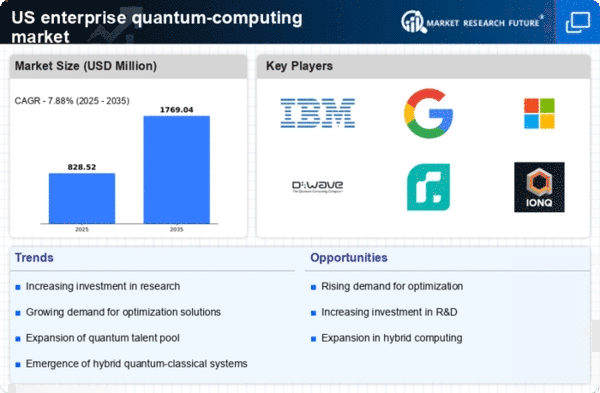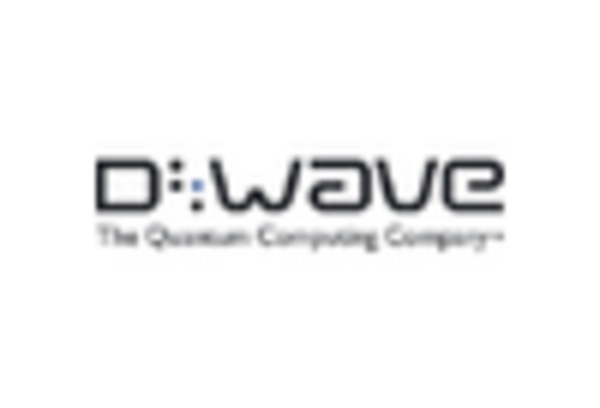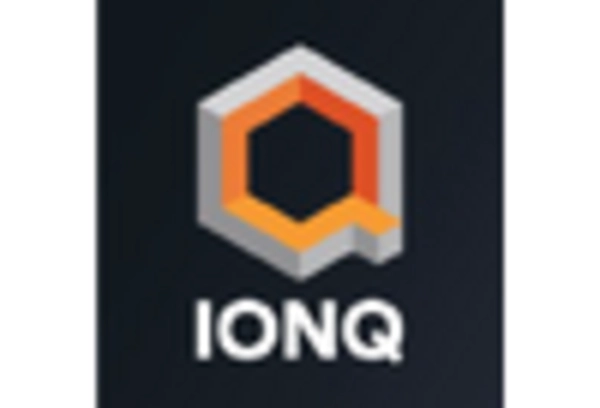Government Initiatives and Funding
Government initiatives play a crucial role in the growth of the enterprise quantum-computing market. In the US, federal funding for quantum research and development has seen a significant increase, with allocations reaching over $1.2 billion in recent years. This financial support aims to foster innovation and collaboration between public and private sectors, encouraging the development of quantum technologies. Additionally, government-backed programs are designed to enhance workforce training in quantum computing, ensuring a skilled labor pool for future advancements. Such initiatives not only stimulate research but also create a favorable environment for startups and established companies to thrive in the enterprise quantum-computing market.
Emergence of Quantum-as-a-Service Models
The emergence of Quantum-as-a-Service (QaaS) models is transforming the enterprise quantum-computing market by making quantum technologies more accessible to businesses. This model allows organizations to utilize quantum computing resources on a pay-per-use basis, eliminating the need for substantial upfront investments in hardware. As a result, companies can experiment with quantum algorithms and applications without the financial burden of owning quantum systems. The QaaS market is projected to grow at a CAGR of 25% over the next five years, indicating a strong trend towards cloud-based quantum solutions. This shift is likely to democratize access to quantum computing, enabling a wider range of enterprises to explore its potential.
Growing Interest in Quantum Cryptography
The enterprise quantum-computing market is witnessing a growing interest in quantum cryptography, driven by the need for enhanced security measures. As cyber threats become more sophisticated, organizations are increasingly looking towards quantum cryptographic solutions to protect sensitive data. Quantum key distribution (QKD) offers a level of security that classical methods cannot match, making it an attractive option for sectors such as finance and healthcare. The market for quantum cryptography is projected to reach $1 billion by 2027, indicating a robust demand for secure communication solutions. This trend suggests that as enterprises prioritize data security, the adoption of quantum cryptography will likely accelerate, further propelling the enterprise quantum-computing market.
Rising Demand for Advanced Computing Solutions
The enterprise quantum-computing market is experiencing a surge in demand for advanced computing solutions, driven by the need for enhanced processing capabilities. Industries such as finance, pharmaceuticals, and logistics are increasingly seeking quantum computing to solve complex problems that classical computers struggle with. For instance, financial institutions are leveraging quantum algorithms to optimize trading strategies and risk assessments, potentially reducing operational costs by up to 30%. This growing interest indicates a shift towards adopting quantum technologies, as organizations recognize the competitive advantage they can gain. As a result, investments in quantum infrastructure and talent are likely to increase, further propelling the enterprise quantum-computing market forward.
Increased Focus on Quantum Software Development
As the enterprise quantum-computing market evolves, there is an increasing focus on developing specialized quantum software. This software is essential for harnessing the capabilities of quantum hardware and translating complex problems into quantum algorithms. Companies are investing heavily in research and development to create robust quantum programming languages and tools that facilitate easier integration with existing systems. The software segment is expected to account for approximately 40% of the total market share by 2026, reflecting the critical role it plays in the overall ecosystem. This emphasis on software development is likely to drive innovation and enhance the usability of quantum technologies across various industries.
















